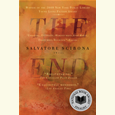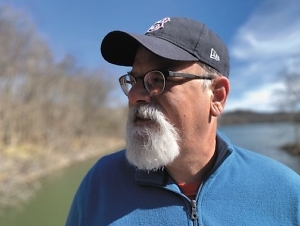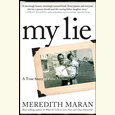Gratitude and Loss
Angela Tucker wants us to understand the complexities of adoption
The title of Angela Tucker’s You Should Be Grateful echoes the misguided comments people sometimes make to adoptees, especially the ones who admit that they have mixed emotions about being adopted. The book opens with a 10-point “Adoptee Manifesto” that includes the line “It’s okay to feel a mixture of gratitude and loss.” Validating the complex, sometimes contradictory feelings of adoptees is a mission for Tucker, one she has pursued through work as a consultant and mentor, as well as in films, a podcast, and now this book.
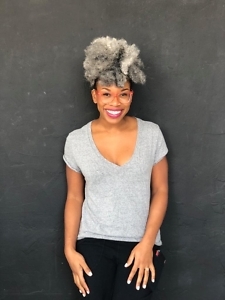
Tucker has a particular interest in the experiences of transracial adoptees because she’s one herself. Born to a Black mother in Chattanooga in 1985, she was placed in foster care and eventually adopted by a white couple who raised her — along with seven siblings, six of them also adopted — in Bellingham, Washington, a place where people were not accustomed, she writes, “to seeing mixed-race families in their midst.”
Although Tucker is quick to acknowledge the love and support of her adoptive parents, who were active participants in her search for her birth family, she’s keenly aware that “being honest about adoption is a tricky minefield to navigate,” and not all adoptive families are so open. By sharing her own story and the stories of other adoptees, she hopes to make the path toward openness and honesty a little easier to follow.
Tucker answered questions from Chapter 16 by email.
Chapter 16: If there’s a single takeaway from the book, it seems to be that feelings around adoption are inevitably complicated, and it’s almost impossible to discuss the subject without potentially hurting someone. Why is it so important to talk about it anyway?
Angela Tucker: When we avoid adoption-related conversations because they are complex, we are essentially trying to stay safe and well liked. Unfortunately, avoidance can also equate to harming someone. The reason the conversation is complex is because it forces us to think about the way we care for certain people and not others. It forces us to think about the reasons we’ve decided some people are unfit and others aren’t.
Avoiding topics of classism, racism, and entitlement means we are doomed to continue practices that are harmful to some. While many adoptees have adjusted to their adopted life, one in four adoptees who seek therapy is contemplating taking their own life. The only way we can work to change this statistic is by talking about why this is happening. We are capable of having complex conversations with compassion, boundaries, and empathy. I know we are.
Chapter 16: There was so much vulnerability and intense feeling in your quest to find and get to know your birth parents. Was it hard for you to be so open in the book about the difficult emotions involved?
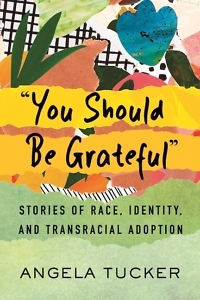 Tucker: I learned about the power of vulnerability after the documentary Closure, which featured the search for my biological parents, came out. The resounding feedback from adoptees was that they felt it gave them permission to search for their biological parents.
Tucker: I learned about the power of vulnerability after the documentary Closure, which featured the search for my biological parents, came out. The resounding feedback from adoptees was that they felt it gave them permission to search for their biological parents.
The unspoken rule has long been that the only adoptees who search for their birth parents are those who had terrible adoptive parents. My film countered that narrative by showing my adoptive parents supporting me and becoming detectives right alongside me. Given that experience, I felt hopeful that my honesty in the book could provide similar relief or, better yet, provide language for experiences that I know many other adoptees feel. It is my hope that adoptees no longer feel a sense of shame or being gaslit [after] reading some of my emotions that I share.
Chapter 16: You describe one encounter that made you cringe, when a white adoptive mother told you she tries “not to talk about adoption or race too much” with her Black son. Can you explain why this well-meaning approach does not serve the needs of the child in a transracial adoption?
Tucker: A colorblind attitude precludes everyone from embracing the beauty that is Blackness. America has seen some incredible gains strictly as a result of Black culture: blues music, our travel infrastructure, commodities like cotton that fuel our economy, Nobel Laureates, like Toni Morrison, entertainment, the list is endless. By saying “I don’t see color,” people erase the origin of these feats and uphold the status quo — whiteness. To proclaim “Black Lives Matter” means to understand these feats within an American context. Only when we do this can we see the shame it is to pretend that differences don’t exist. What a bland society it would be if we pretended that we were all the same!
Chapter 16: I was a little surprised to learn from the book that many U.S. adoptees still have no legal right to see their original, unredacted birth certificates. Are there policy changes around adoption you’d like to see happen at the national level?
Tucker: It’s quite surprising, huh? Adoptees United is an organization working on this issue. The Adoptee Rights Law Center website shows a map of the country and highlights what current bills are moving through the house or senate [of each state]. For example, in Georgia, a straightforward bill that restores the right of adult adopted people, at age 18, to request and receive a copy of their own birth record passed the senate but died in the house. They are working to reintroduce the bill in 2024.
Tennessee is a “compromised” state, which basically means that maybe an adoptee can apply for their original birth certificate, but maybe not. An adoptee would not be able to access the document if a birth parent has vetoed it or an adoptive parent won’t consent. And if it is provided to an adoptee, it could be heavily redacted.
Chapter 16: You Should Be Grateful is focused primarily on centering the experiences of adoptees, especially in transracial adoptions, but you advocate strongly for birth mothers, too. What can we do to care for them better, both in terms of cultural awareness and social policy?
Tucker: A language shift is a good place to start. Some birth mothers have advocated for being called first mothers. This is not a unanimous request, but even bringing up the conversation with individuals whose children have been adopted communicates that they have a place in their child’s life. Listening to a birth mother’s opinion on this language shift may also reveal more information about why she was unable to parent her child. This conversation might lead to one of those “complex conversations” through which, if we choose to engage in them, we could be rewarded with helping the adoptee have a clearer understanding of their status as an adoptee.
Policy-wise, we shouldn’t allow any adoption to be closed. I worked with a team to create the Inclusive Family Support Model, which means every adoption can be open. In our model, openness is not synonymous with physical contact. Adoptive parents can create an open relationship with a biological parent who is deceased or unsafe because they’re sharing all of the facts that they know about the parent. They aren’t simply avoiding the conversation since they’re not around to prompt a discussion. Adoptees can handle knowing the truth. A “spirit of openness” provides that.

Maria Browning is a fifth-generation Tennessean who grew up in Erin and Nashville. Her work has appeared in Guernica, The Los Angeles Review of Books, Literary Hub, and The New York Times. She’s the editor of Chapter 16.

